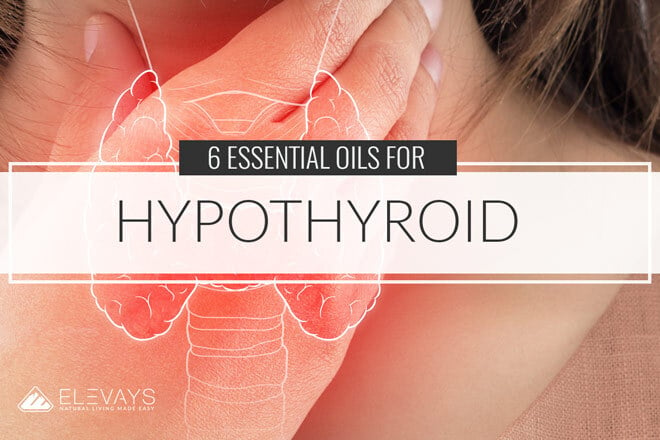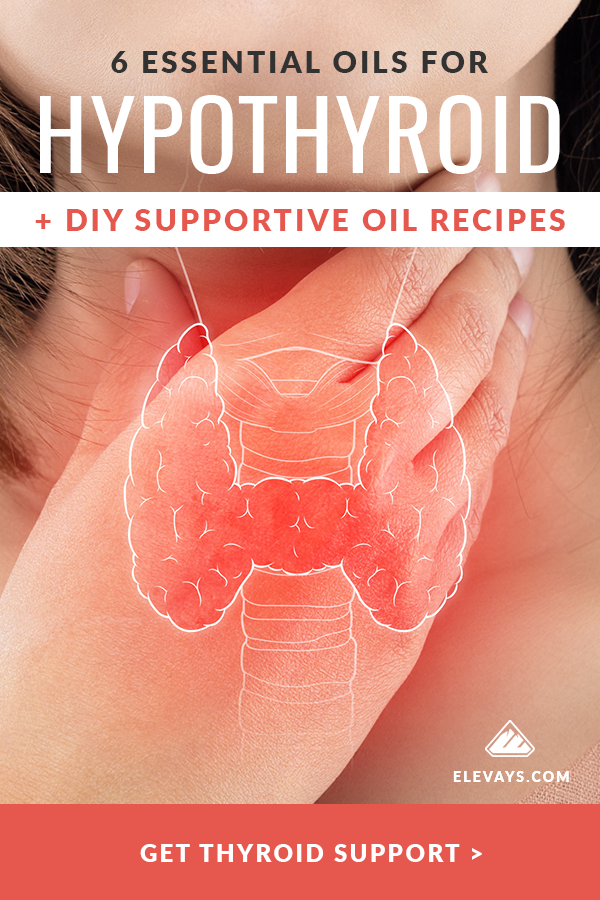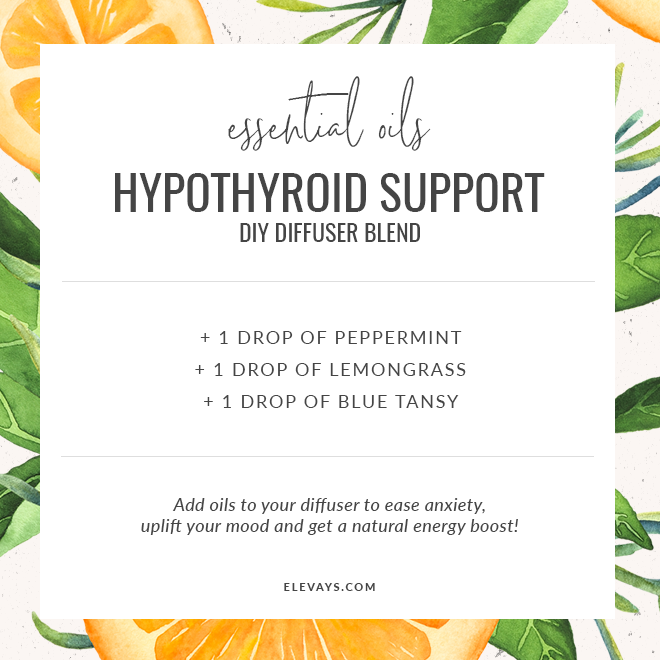Up to 20 million Americans have some sort of thyroid disease (1), and the most common go-to remedy is prescription medication or synthetic hormones that must be maintained for life! If you want to bypass (sometimes unnecessary) prescription medications, ease common ailments and symptoms, and support thyroid healing, keep reading. Today, we’re talking specifically about Hashimoto’s Thyroiditis and the best essential oils for hypothyroidism.
Hypothyroidism is thought to happen when the body starts to create a lot of inflammation that attacks the thyroid and wears it down. The truth is, science doesn’t exactly know what truly causes hypothyroidism, and there is a lot of misinformation out there. What we do know are the symptoms:
- Cold hands and feet
- Weight gain or loss
- Diminished fertility
- Depression
- Fatigue
- Lack of appetite
- Hair fall out
- Aches/pain
- Night sweats
- Brain fog
- Mood swings
These symptoms are where essential oils come in. Oils are natural remedies that work to ease symptoms and support a strong and healthy thyroid. Here are six essential oils for hypothyroidism.
TRUTH BOMB:
You’re
Already killing it!
If You Were More Consistent With Your Wellness Routine, You’d Be Unstoppable.
6 Oils for Hypothyroidism
Clove
People with hypothyroidism tend to run cold. Clove essential oil has incredible warming properties that support body heat and proper circulation. Some also experience poor digestion and a sluggish liver, which clove can also help with.
Because clove is a potent anti-fungal, it can also help those who struggle with candida as a result of an underactive thyroid. Clove’s high amount of antioxidants can also support your immune system, which is usually very weak in people with hypothyroidism.
How To: Mix 1 drop of clove in ½ -1 teaspoon of raw honey and mix into your hot tea. Diffuse 5 drops in a diffuser. Add 1-2 drops to a ½- 1 teaspoon of a carrier oil and massage into hands and feet.
Peppermint
As noted above, if you suffer from hypothyroidism, you may find increasing levels of digestive discomfort. Peppermint essential oil can work to relax the muscles of your digestive tract to ease indigestion, upset stomach, or gas.
Peppermint can also work to improve circulation and give a much-needed energy boost for when you feel fatigued, another common symptom of hypothyroidism.
How To: Mix 1-2 drops of peppermint with 1 teaspoon of carrier oil and massage onto the tummy area. Inhale directly from the bottle or diffuse 4-5 drops for an energy boost.
Blue Tansy
Blue Tansy is thought to lower histamine response in the body, which is perfect for hypothyroidism. This anti-inflammatory and warming oil can help with sore joints, muscles, or other aches and pains. When inhaled, blue tansy can also ease emotional stress.
How To: Add 1-2 drops of blue tansy to 1 teaspoon of carrier oil and massage onto areas of pain. Diffuse 5-6 drops to foster a peaceful state of mind.
Lemongrass
Lemongrass is a potent antioxidant and anti-inflammatory source that can also be excellent oil for easing nausea or upset stomach. Bonus: Lemongrass may also regulate blood sugar!
Utilize the aromatic benefits of lemongrass to ease intense stress and anxiety associated with hypothyroidism.
How To: Mix 1 drop with raw honey and add to tea. Apply 1-2 drops of lemongrass with ½ -1 teaspoon of carrier oil and apply topically to the thyroid area. Drop 5-6 drops of lemongrass into a diffuser to ease anxious feelings and stress.
Myrrh
Myrrh’s powerful antioxidant and immune-boosting qualities offer incredible support to those suffering from hypothyroidism. For instance, Myrrh can help reduce the inflammation that happens with any thyroid problem, and some people have found success using it topically to reduce goiters (2).
How To: Mix 1 drop with raw honey and add to tea. Apply 1-2 drops of myrrh with ½ -1 teaspoon of carrier oil and apply topically to the thyroid area. Drop 5-6 drops of myrrh into a diffuser for aromatic benefits.
Frankincense
The King of Oils is definitely not left out on the list of oils that support hypothyroidism. For example, Frankincense is a super anti-inflammatory that gets down to the cellular level that can help calm inflammation. It can also help improve focus if brain fog is one of your symptoms!
How To: Inhale frankincense straight from bottle or add to diffuser to create a grounding and relaxing environment.
DIY Essential Oil Recipes for Hypothyroidism
ANTIOXIDANT BOOST FOR HYPOTHYROIDISM
- 1 Drop of Myrrh Essential Oil
- 1 Drop of Clove Essential Oil
Mix oils with ½ teaspoon to 1 teaspoon of honey and add to a cup of tea or water to ease inflammation and support circulation.
UPLIFTING ESSENTIAL OIL BLEND FOR HYPOTHYROIDISM
- 1 Drop of Peppermint Essential Oil
- 1 Drop of Lemongrass Essential Oil
- 1-2 Drop of Blue Tansy Essential Oil
Add oils to your diffuser to ease anxiety, uplift your mood and get a natural energy boost!
STRESS-EASE BATH SALTS
- 1 Cup of Epsom salts
- 3 Drops of Frankincense Essential Oil
- 2 Drops of Myrrh Essential Oil
- 2-3 Drops Juniper Berry Essential Oil
Drop the oils into the Epsom salts and mix well. Run these in a warm bath and soak for 15-30 minutes. This grounding, anti-inflammatory mixture will soothe anxiety, ease aches and pains and help heal any skin issues.
Foods to Support a Healthy Thyroid
In addition to essential oils, whole foods are another incredible, all-natural way to support and potentially heal a poor functioning thyroid.
A good rule to start with is boost iodine through natural sources like tuna, shrimp, cod, iodized salt, seaweed, and kelp. Also, make sure to get proper selenium intake by opting for foods like chicken, turkey, eggs, Brazil nuts, shiitake mushrooms, liver, and lamb.
Other fruits and vegetables that support a healthy thyroid are artichokes, bananas, cucumbers, celery (juice and sticks), radishes, potatoes, garlic, and barley grass.
Real, whole foods are a great idea to load up on in conjunction with essential oils to work toward healing and easing symptoms of hypothyroidism. For more info on the best and worst foods for Hashimoto’s check out this article. Now that you have an idea on how to support yourself naturally, what are you most looking forward to?
- American Thyroid Association (2018). “General Information.” Retrieved from: https://www.thyroid.org/media-main/press-room/
- Natural Endocrine Solutions (2018). “Can Myrrh and Frankincense Benefit Thyroid Health?” Retrieved from: https://www.naturalendocrinesolutions.com/articles/can-myrrh-and-frankincense-benefit-thyroid-health/











Thank you for this information.
I did not have my thyroid testing done until I was diagnosed with depression and I began having 6 other symptoms on your list. I was in my early 40’s at the time.
I was also tested for antibodies against my thyroid and it was positive. I did develop Graves Disease when I decided to go off medication and see what would happen. Interesting enough, it was my psychiatrist who ordered these tests and as he told me, most primary docs don’t think to order these tests when one is diagnosed with depression.
So much more is now known about this and that is why I appreciate this article and how we can treat our bodies with EOs.
Recently I have required a larger dose of levothyroxine and it is distressing. So I will be using this article and the oils.
I’m glad this article was helpful! That’s awesome that your psychiatrist was proactive in ordering those labs!